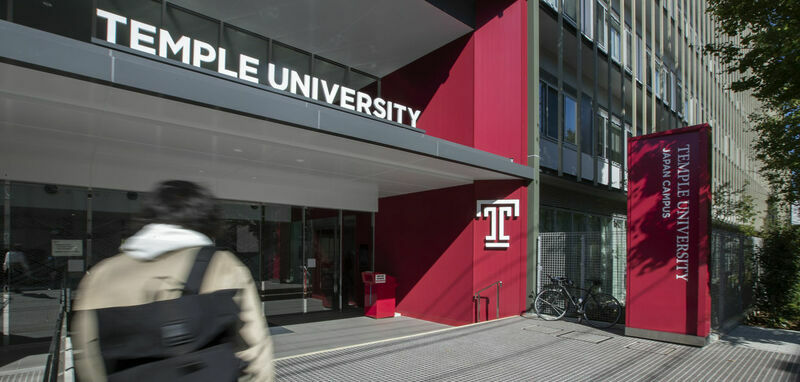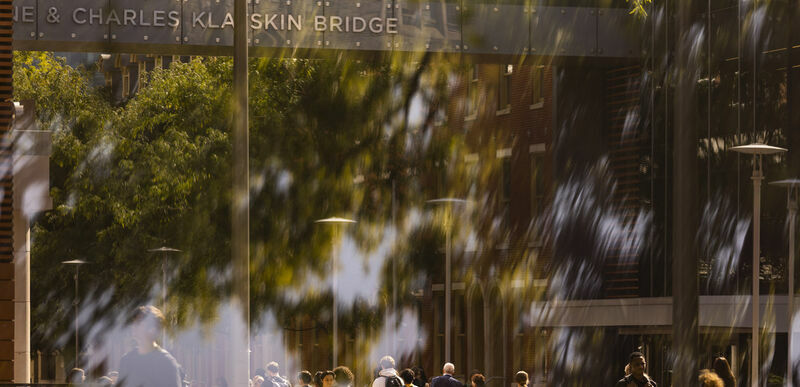Set for success: Temple’s peer ambassador program helps first-year students transition into campus life
Student success ambassadors from the Division of Enrollment Management provide guidance and resources to first-year students to help them navigate academic and campus life.

Entering college is both exhilarating and intimidating. Students enjoy everything campus life has to offer while also at times feeling unsure or overwhelmed in their new environment. Temple has many resources and systems to help students, but new Owls may not always know where to go or what’s available, which can impact their ability to succeed.
When looking to enhance student success at the university, the Division of Enrollment Management recognized that first-year students could use additional support.
“I found that we weren’t aligning with students’ expectations when they come to college,” said Shawn Fagan, assistant vice provost of student success in the Division of Enrollment Management. “This current generation of college students are used to instant service and information. We expect them to self-diagnose and figure out how to get help, but it’s important to understand that today’s student needs a lot of navigational support.”
Enter student success ambassadors—peers who work with these students to offer guidance and resources. The ambassadors are tasked with communicating with first-year students throughout the semester both in person and virtually, answering questions; offering recommendations; and directing them to specific resources such as financial aid, library services, Student Affairs, the Cherry Pantry and more.
“Launching the student success ambassador program during the fall 2024 semester has been a transformative step toward empowering our students to take an active role in supporting their peers,” said Jose Aviles, vice provost for enrollment management. “These ambassadors play a critical role in proactive outreach, providing timely information that is essential to supporting student success. This program reflects our commitment to fostering a community of mentorship and collaboration, ensuring that every student has access to the guidance and resources they need to thrive.”
The program underscores the value of shared experiences among students and peer-to-peer support.
“Advising is an excellent resource for students, but there are inherent limitations in how it can fully address every student’s needs,” said Fagan. “And while I may have a lot of knowledge, experience and expertise to offer, I don’t necessarily know what it’s like to be an undergraduate right now. That’s why we are looking for guidance from current students; new students value their input because they’re the ones going through it.”
The program targeted approximately 900 first-year students who were identified as having a 50% chance of retention. The division used a data-driven approach to select those who would benefit most from additional support. It then hired 16 ambassadors from various majors and class years to each work with about 60 students.
“We try to meet these students where they are and provide just-in-time coordinated care,” said Fagan. “All of the communication is sent from the ambassadors, using their own voice and sharing their experiences to connect. Vulnerability can lower people’s guard so that they’re more open to ask for help, which is a hard skill to learn, especially for these first-year students entering a new, different environment.”
For example, ambassadors have used midterm progress ratings to provide positive, affirming messages to first-year students. They’ve also assisted with registration by sharing the steps for it and sending reminders as well as offering more outreach to those facing barriers that prevent them from registering.
When Julissa Rodriguez, Class of 2027, signed on as a student success ambassador, she knew it was an opportunity to share resources with first-year students who may feel intimidated or unsure.
“As an ambassador, you have knowledge that’s important to impart, especially to first-year students who usually don’t know how to navigate campus or balance college life,” said Rodriguez, a communications and social influence major from Philadelphia. “I know about certain scholarships and tutoring websites and how to direct people to the student financial aid office. I even made a registration guide for students. It’s a learning experience for me as well when students ask me things I don’t know. College students helping other college students is beneficial.”
As a transfer student, Camille Small felt inspired to become a student success ambassador.
“When I heard about the program, it sparked my interest because it was exactly what I could have used when I transferred from the University of Maryland Eastern Shore,” said Small, an information science and technology major from Baltimore who will graduate in December 2025. “Everyone has a unique story to tell. You may not think you have any information to offer somebody, but you’d be surprised by how many things people can learn from you. I’ve experienced what these students are going through, so I’m able to help them.”
Kaylah Chambers, Class of 2027, also wanted to serve students after struggling her first year. “I love meeting with students to help them, and they’re excited and grateful to receive the help,” said Chambers, a mechanical engineering major from Baltimore. “Anything you need, come to us, and we’ll help you figure it out.”
Among the student success ambassadors, Fagan has noticed a desire to make a difference and an ability to overcome adversity.
“Temple students have this altruistic nature woven into their fabric,” he said. “They genuinely want to give back. Working as an ambassador teaches and demonstrates a variety of skills. They’re engaging in problem-solving and customer service, interacting with diverse populations and managing caseloads. It’s not easy work, but it’s rewarding and impactful to help a student.”
The Division of Enrollment Management plans to grow the student success ambassador program. It is launching a one-stop student services center called Direct TU, which aims to collate services that tend to be barriers for students, such as financial aid. The student success team can then be present at the Direct TU one-stop student services center to answer questions and share information.
Additionally, the division is hiring student success specialists to oversee the ambassadors. Enrollment Management also plans to open a student success management platform that will optimize student support by integrating academic advising, communication and data analytics to improve retention, boost student success and foster collaboration. And it hopes to eventually launch another platform in which students can use a thumbs-up, thumbs-down system to indicate how they’re doing.
“The student success ambassador program shows our commitment to student success and serving students,” said Fagan. “Every student that comes to Temple should have the opportunity to reach their full potential, and we’re only scratching the surface in reaching our full potential with this program. I’m excited to be part of this work.”


